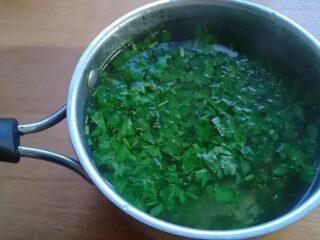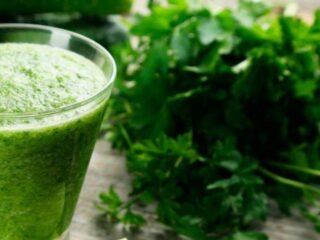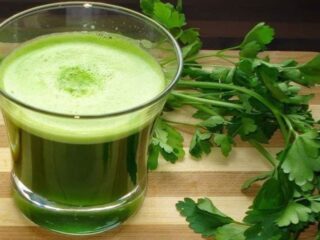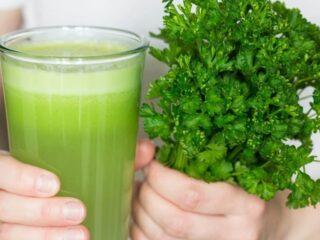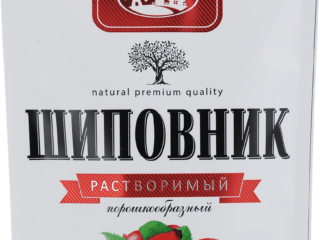Content
- 1 Chemical composition of parsley
- 2 What are the benefits of parsley for the human body?
- 3 How much parsley can you eat per day?
- 4 Is it possible to eat parsley every day?
- 5 Health benefits and harms of parsley juice
- 6 Beneficial properties of parsley infusion and contraindications
- 7 Beneficial properties of parsley tea and contraindications
- 8 How to use parsley for medicinal purposes
- 9 How to use parsley for cosmetic purposes
- 10 Harmful properties of parsley for the human body
- 11 What diseases should you not eat parsley for?
- 12 Conclusion
The beneficial properties and contraindications of parsley are determined by its chemical composition. Greens contain many vitamins, microelements and other valuable compounds. But you can consume no more than 100 g per day - otherwise there will be more harm than good.
Chemical composition of parsley
Parsley contains quite a lot of useful substances:
- vitamins;
- trace elements (potassium, calcium, magnesium, silicon, phosphorus, cobalt, copper, fluorine, manganese, chromium, zinc, selenium, iodine);
- cellulose;
- organic acids;
- essential oils.
What vitamins are contained in common parsley?
Along with microelements, parsley also contains vitamins:
- A (in 100 g 100% of the daily value);
- Group B, including B1, B2, B5, B9;
- C (170% daily requirement);
- K (130%).
The benefits of parsley are due to the fact that it contains a lot of vitamins C, A and K. In fact, you can eat just one bunch to get your daily requirement and even more. There are not many other vitamins in it - within 10% of the daily requirement. Therefore, parsley cannot be considered a source of all nutrients. It is necessary to consume other foods as well.
How many calories are in parsley
The benefit of parsley for the body is that it is a low-calorie product. 100 contains only 49 kcal. Nutritional value for the same weight:
- proteins – 3.7 g;
- fats – 0.4 g;
- carbohydrates – 7.6 g.
Parsley also contains quite a lot of dietary fiber - more than 2 g per 100 g. This is 10% of the daily intake. The main part is water - 85%, dry matter accounts for a total of 15%.
What are the benefits of parsley for the human body?
Thanks to its rich chemical composition, parsley provides quite a lot of benefits for the human body:
- strengthening the immune system;
- improved vision;
- prevention of respiratory infections;
- suppression of the activity of pathogenic bacteria;
- improved digestion;
- lowering blood sugar levels, which is especially important for diabetics;
- stimulating the restoration of the skin epidermis;
- regulation of metabolic processes, fat burning;
- treatment of pustules, rashes;
- strengthening the myocardium (heart muscle);
- participation in hematopoietic processes;
- diuretic effect, removal of kidney stones;
- regulation of gastric juice synthesis;
- removal of toxins and waste.
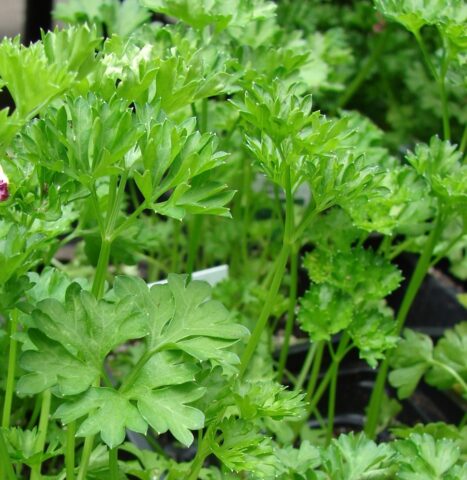
Parsley removes toxins well and strengthens the immune system
The benefits of parsley for a woman’s body
The benefits of fresh parsley for a woman’s body come down to the following properties:
- reduction of pain during the monthly cycle;
- skin healing;
- relief of physical and emotional stress due to the presence of etiol. The effect on the body of this substance is similar to the female sex hormone estrogen.
Another important point is that parsley contains vitamin B9 (folic acid), and 100 g contains 30% of the daily requirement. This substance is of great benefit during pregnancy, as it promotes the normal formation of the fetus and prevents developmental abnormalities.
Certain components of parsley can lead to increased uterine tone. If there is a threat of miscarriage, the use of this plant is excluded.
The benefits of parsley for the male body
The benefits of the plant for men are also known:
- Strengthening the immune system, increasing endurance and stress resistance, which is especially important during prolonged physical activity.
- Parsley is an aphrodisiac. It enhances potency and awakens sexual desire.
- If you regularly make scalp masks based on crushed herbs, this will prevent the problem of baldness.
- Parsley broth with carrots, potatoes and celery will help cope with a hangover.
- Parsley seeds and roots are good for strengthening prostate muscles. Their benefits include preventing prostatitis, as well as dissolving and removing stones.
Along with its health benefits for men, parsley can also cause some harm. With regular abuse, problems with the kidneys and liver are possible. We must not forget that the plant has a diuretic effect. This is especially important for drivers to remember.
Beneficial properties of parsley for children
For children, this greenery is beneficial in several ways:
- strengthening the immune system;
- bone improvement;
- removing excess fluid from the body;
- restoration of metabolism.
You can introduce grass into your diet starting from the age of eight months (fresh or boiled). The first 5-7 days are a waiting period, when you need to observe the body’s reaction. You should start with small amounts - literally 5 g per day. Constantly eating greens is acceptable from 2-3 years of age. If allergic reactions occur, stop taking the drug immediately. In such cases, it is better to consult a doctor.

You can start giving greens to children at 8-9 months.
How much parsley can you eat per day?
In order for parsley to bring maximum benefits, you need to follow the norms of consumption. Doctors recommend eating no more than 100 g of greens per day. And pregnant women can eat a maximum of 2 branches, i.e. up to 30 g per day. Children of the first year of life can eat up to 5 g per day, then the amount is gradually increased.
It is known that the composition includes the substance myristicin, which in large quantities (more than 100 g per day) leads to headaches, convulsions, hallucinations and weight loss.
Is it possible to eat parsley every day?
Parsley needs to be eaten correctly, i.e. taking into account the daily norm. At the same time, daily consumption of this greenery is possible both fresh and boiled or stewed. The herb is also used in the form of tea.The constant inclusion of the product in the diet is permitted only in the absence of medical contraindications, including individual intolerance.
Health benefits and harms of parsley juice
Parsley juice also has healing properties. This is a powerful vitamin supplement to basic food. It provides the body with undoubted benefits:
- removal of toxins and excess salts;
- prevention of kidney stones;
- strengthening the immune system;
- improvement of metabolism;
- appetite stimulation;
- decreased blood glucose levels;
- improving the functioning of the hormonal system.
It is important to understand that juice is a concentrate, so it only provides benefits if the consumption limit is met. An adult can take no more than 1 tablespoon of this product per day.
Beneficial properties of parsley infusion and contraindications
An infusion of parsley in boiling water has benefits for various organs:
- improves the condition of patients with urolithiasis;
- helps strengthen teeth and whitens enamel;
- helps strengthen gums;
- prevents eye diseases;
- removes toxins from the body;
- inhibits pathogenic fungi and bacteria;
- stimulates mucus discharge, treats cough;
- lowers blood sugar levels;
- improves blood circulation.

The decoction helps replenish the deficiency of vitamins and minerals
The infusion is also used externally. It is a natural antiseptic that helps eliminate cuts, bruises, and insect bite marks.
Along with the medicinal properties of parsley infusion, it also has contraindications:
- dehydration;
- kidney disease;
- hypothyroidism;
- cystitis;
- individual intolerance to any component of the plant.
Beneficial properties of parsley tea and contraindications
Tea provides approximately the same benefits as decoction. It strengthens teeth, gums, bones, stimulates digestion, improves metabolism. But it is worth keeping in mind that vitamin C is destroyed already at a temperature of 60 degrees. Therefore, drinking such a drink will not benefit the immune system.
In addition, there are certain contraindications. For example, tea should not be drunk during pregnancy, but with caution during breastfeeding (it is better to consult a doctor). It is also important to remember the diuretic effect of the drug. Therefore, if you are dehydrated or in hot weather, you should not drink this drink either.
How to use parsley for medicinal purposes
Parsley retains its benefits when fresh, frozen or dried. It is also used in the form of tea and decoction. As a rule, the drug is used internally for medicinal purposes. External use is also possible, for example, for the treatment of ulcers. Moreover, to prepare medicines, they take not only herbs, but also seeds, as well as the root of the plant.
For kidney diseases
To treat urolithiasis, dissolve stones and remove excess salts from the body, proceed as follows:
- Take two small roots and chop them thoroughly.
- Pour in 0.5 liters of water and 0.5 liters of milk.
- Place on the stove, bring to a boil and immediately turn off.
- In order for the product to bring maximum benefit, the composition is infused under the lid until it cools completely, then filtered.
- Take 100 ml three times a day. The course lasts a month, after which they take the same break. If necessary, the cycle is repeated.
To normalize blood pressure
The herb also has benefits for lowering blood pressure. To do this, proceed as follows:
- Take 700 g of greens (fresh).
- Grind and pour in 300 ml of milk.
- Cook over very low heat until half of it has evaporated.
- Cool and filter.
- Take 2 tbsp every hour. l. (30 ml).
For painful menstruation
The benefits of the plant are also associated with the relief of pain during menstruation. For these purposes, prepare a decoction:
- Take 200 g of greens.
- Grind thoroughly.
- Fill with a liter of hot water.
- Cook over low heat for 15 minutes.
- Cool and filter.
- Take 2 tbsp. l. every hour until you feel better.
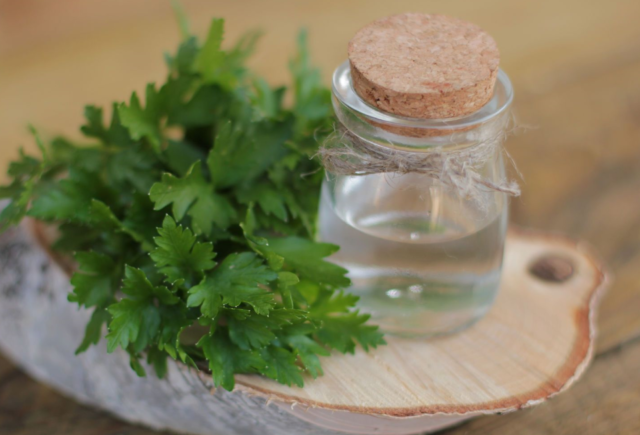
The decoction helps with painful menstruation
For swelling
To treat edema, it is recommended to take 800 g of parsley seeds, put it in a saucepan and pour milk of any fat content. Then put on very low heat and keep until half of the milk has evaporated. Strain through cheesecloth, squeeze thoroughly and take a tablespoon every hour. This remedy is also useful in the treatment of cystitis.
How to use parsley for cosmetic purposes
Parsley has benefits for the skin as it stimulates skin repair and also strengthens hair. To do this, it is recommended to regularly make nourishing masks according to the recipes described below.
Anti-wrinkle mask
To eliminate wrinkles use the following recipe:
- Place a few stems (50 g) in a blender.
- Grind to a paste.
- Apply the mixture to wrinkles, including the area around the eyes.
- Soak cotton pads in water and place them on top.
- After 20 minutes, wash off with warm water.
- This procedure must be repeated 2-3 times a week.
To strengthen hair
The benefits of the plant for hair are associated with its strengthening and healing. To do this, it is recommended to regularly use a mouthwash, which can be prepared according to this recipe:
- Take 50 g of greens, chop finely.
- Pour a liter of boiling water.
- Leave for 15 minutes covered.
- Strain through a sieve.
- Rinse hair after shower.
- There is no need to rinse off - just squeeze out the excess and leave to dry.
Harmful properties of parsley for the human body
If the daily norm is regularly violated, the herb can do more harm than good. The most common consequences of overusing greens:
- headache;
- convulsions;
- dehydration;
- hallucinations;
- weight loss;
- nausea, digestive disorders.
What diseases should you not eat parsley for?
In some cases, parsley should not be eaten (even in small quantities). Strict contraindications are associated with the following diseases:
- acute kidney pathologies (with inflammation);
- nephritis;
- bladder stones;
- low pressure;
- hypocalcemia;
- cystitis in the acute stage;
- pregnancy (only by consultation with your doctor).
Conclusion
The beneficial properties and contraindications of parsley manifest themselves in different ways. When consumed in moderation, greens provide many benefits through vitamins and minerals. It is important to note that parsley is best eaten fresh, frozen or dried.

